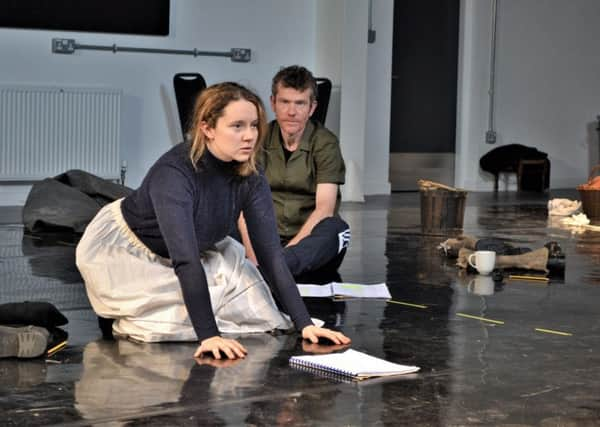Theatre preview: Perth Theatre prepares to reopen with a revival of David Harrower's Knives In Hens


For the young playwright in this scene, though, things are not going so well. At a table in the bar, the Traverse’s literary manager Ella Wildridge is telling him that the theatre will not be producing his first play, an angry 200-page epic called The Unwalked Land, about the history of land ownership in Scotland; and she is telling him why, in no uncertain terms. The young playwright leaves in a rage; but not before the theatre’s new associate director, Philip Howard, has told him that he thinks some of the writing shows promise. “I’ll show you,” seethes the young writer, who is eking out a living washing dishes and driving a delivery van around Edinburgh; and after a sometimes tortured retreat to his mother’s house in Priestfield, he emerges with a new and very different play, a tight, short piece, with first five characters and then just three, based on one brief monologue scene from the earlier epic drama.
This was the birth of Knives In Hens, an intense, brief, beautifully written archetypal drama about the transition from a pre-industrial world to one more driven by words and information, seen through the eyes of a character known only as Young Woman, the wife of a ploughman in a farming village that could be anywhere, from Siberia to South America. Restless in her marriage, the Young Woman becomes increasingly drawn to the local miller, Gilbert; he reads books, and introduces her to a world of words and ideas, full of creative and destructive power, from which she finds there is no return.
Advertisement
Hide AdKnives In Hens opened at the Traverse in June 1995 to immediate acclaim, and transferred later that year to the Bush in London; and within a year, Thomas Ostermeier was directing a translated version in Berlin, as Knives In Hens began an international career that would see it produced in more than 20 countries and languages. It became the foundation-stone for David Harrower’s impressive career as one of Scotland’s most powerful, poetic and thoughtful dramatic writers for both stage and screen, with plays like Ciara, A Slow Air, Good With People and Blackbird; and now, 23 years on, it’s being revived at the newly-reopened Perth Theatre as the first main-stage show of the year, by Perth’s new artistic director, Lu Kemp.
“I first saw Knives In Hens when it came back to the Traverse in 1997,” says Kemp. “I was working in the box office then, and I remember it as a play that just absolutely caught me by the gut, on this deep physical level. So when I was programming this first season in Perth, I thought of it immediately. It’s a great play, it’s set in a rural space that has a lot of resonance for a Perth audience; and, surprisingly, it’s still not that well known in Scotland.”
Given its small scale and sheer dramatic intensity, Knives In Hens has never been short of revivals, including a few here in Scotland. In 2011, the National Theatre of Scotland staged a wildly radical production, by Belgian director Lies Pauwels, that had the characters cavorting in kilts through a conceptual fairground. And last year, when the brilliant South African director Yael Farber directed a fiercely feminist version in London, Guardian critic Michael Billington reflected that “if one definition of a classic is that it constantly yields new meanings, then David Harrower’s play deserves the title”.
“I think the play’s great international appeal, and the fact that it is so open to many interpretations, lies in the fact that it brings together what could be three modern characters, in a setting that’s not just historical but pre-industrial. It somehow solves the problem of writing a historical play without making it an archaeological exercise,” says Howard, its first director, who says he is finding himself constantly reminded of Knives In Hens as he works on his current project, the forthcoming Eden Court tour of Ellie Stewart’s The Return, based on the Martin Guerre story. Kemp says that she is finding herself drawn to the play’s portrayal of people living side by side, but in different worlds expressed in completely different language – a theme which, she feels, resonates strongly with the current state of British and US society.
And for Harrower himself, the play remains a source of intense pride, despite the near quarter-century that has passed since he sat down to write it. “I’m not a writer
who learns much from one project that I can take on to the next,” he says. “When I start a new piece it’s often as if I’ve forgotten how to do it, and I have to reinvent the whole business from scratch – the style, the structure – for the new story. Yet sometimes, I do just go over to the bookshelf and look at my plays. And when I see that first line of Knives In Hens, where the young woman protests against the idea that she is “like a field”, I do feel this sense of pride – that I was able to do that, to find that, when I was still quite young, and under so much pressure; and when I just had no idea whether I would ever be recognised as a writer at all.”
Knives In Hens is at Perth Theatre from 1-17 February, www.horsecross.co.uk/perth-theatre